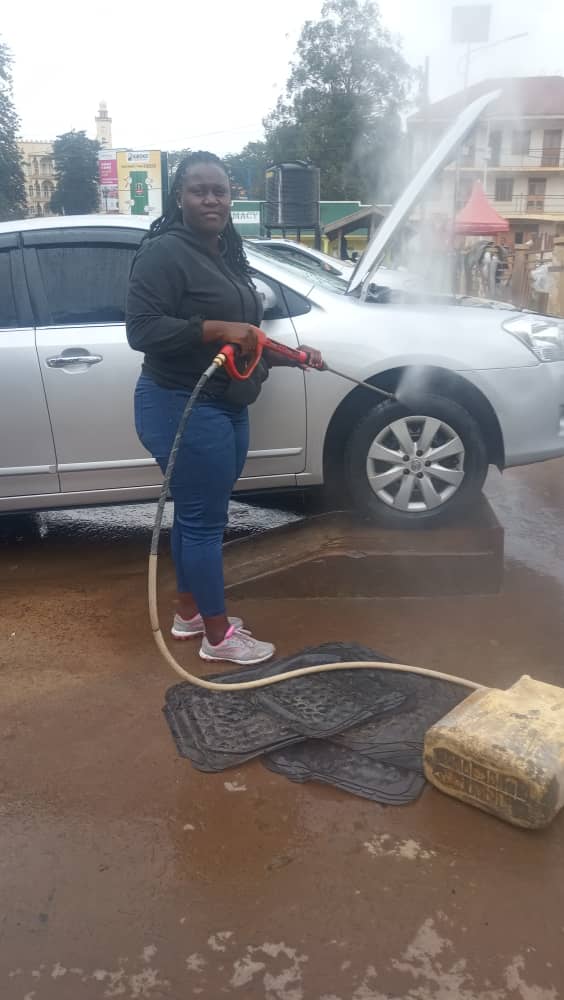
Defying Stereotypes, how Nsungwa thrives in a male-dominated car washing industry
BY HOPE LEONTINA
In the heart of Fort Portal City, at Gardens Restaurant, the car washing section is bustling with activity on this Monday morning. Ms. Nsungwa Evelyn Atwooki, aged 30, stands ready by 8 am, awaiting her clients. One might mistake her for a staff member of the restaurant, but in reality, she is here to earn her living by washing cars.
At 8:30 am, a client arrives at the washing area, accompanied by three male coworkers. They approach the car, insisting that one of them should wash it. To their surprise, the client loudly calls out, “Atwooki, come here please, do it as you usually do. I’ll be back in 30 minutes.”
Nsungwa’s coworkers reluctantly retreat to their seats, conceding the task to her. She takes charge, skillfully maneuvering a jet machine to begin washing the car.
A holder of an O-level certificate and a single mother of two children, Nsungwa said her five-year journey in this predominantly male-dominated and physically demanding job has become her turning point in life since she can now earn a living.
She said it all started after her parents denied her further education when she became pregnant during her senior four vacation.
“My heart yearned to return to school after childbirth, but I was denied the opportunity and spent two years jobless in the village,” she said.
Determined to find work, she sought employment at Gardens Restaurant, initially hoping for a waitress position. However, faced with filled vacancies, she was offered the opportunity to work as a car washer—the only available option at the time.
On her first day, surrounded by curious male colleagues and skeptical eyes, Nsungwa recalls feeling apprehensive but focused.
“With God’s help, one of the workers showed kindness and guided me through,” she recounts. “I gathered my courage and got to work. That day, I didn’t wash a car alone but assisted in preparations, fetching brushes, and soap, and demonstrating how to operate the car washer,” she said.
Reflecting on her journey, Nsungwa expresses gratitude for her initial allowance of Shs 5,000 that evening, a small sum but a meaningful start to her newfound career.
A few days after Nsungwa began her job washing cars, words reached her father and he was displeased, but he remained silent, knowing he had been the one to deny her the opportunity to continue her education after she gave birth.
“At first, I felt unsure, but after some days on the job, I gained strength. Clients started getting used to me, and I began receiving tips [tokens of appreciation] when they saw I could wash cars just as well, if not better, than the men.”
She said a few days later, her supervisor, noticing her dedication, decided to empower her further by teaching her how to use the jet machine. He showed me how to use it, explaining that the machine wasn’t for every car but for specific vehicles that required a less labor-intensive process. This was done to help me appreciate the job and make it easier on my body.
She added, “Now I don’t have to feel pain after washing many cars. One of the bosses realized that, as a woman, I needed support to reduce the physical strain, so they gave me the machine. I was so happy because not all cars require the jet washer, but those that do bring me extra clients, and with them, extra tips. These tips, along with my daily allowance, have helped me increase my income,”
Over the past five years, Nsungwa Evelyn Atwooki has built her life through the earnings from her car washing job. With the money she makes, she has been able to pay school fees for her children, cover her rent, and even join savings groups to start her own business in the future.
Despite the financial progress, her job comes with its own set of challenges, particularly because she is a woman in a male-dominated field. She said some clients, instead of respecting her professionalism, have made advances, suggesting she should fall in love with them in exchange for financial support.
“They always say that if I love them, they can give me capital to improve my life and leave this job. But I don’t trust them. I am making my own money and I’m proud of that, each month, I receive a salary of Shs 150,000, plus additional daily allowances and tips from my clients. I am happy with what I earn and I prefer to focus on my work,” She said.
Her immediate supervisor, Mr Gamukama Joseph, who has been in the same line of work since 1991, praises Nsungwa for her dedication and hard work.
“She’s the second woman I have worked with here, the first one, left after a short time to pursue her studies. Nsungwa has stayed and proven to be as capable as any man in this job, I welcomed her warmly because I knew she, just like me, has responsibilities. She’s hardworking and doesn’t let anything stand in her way,” He said.


